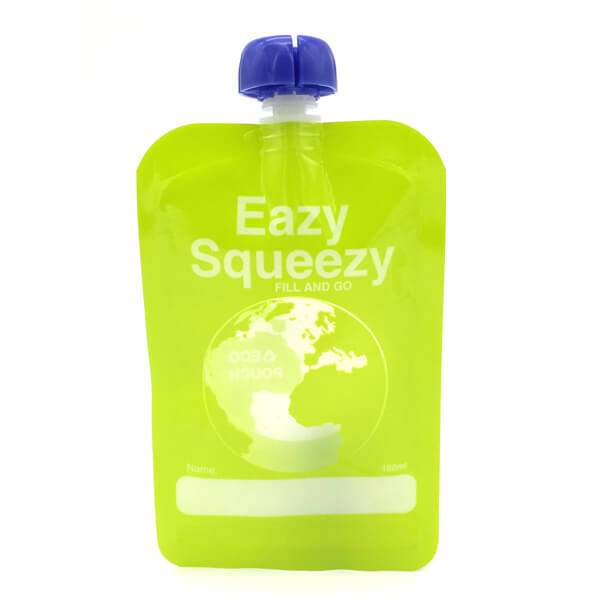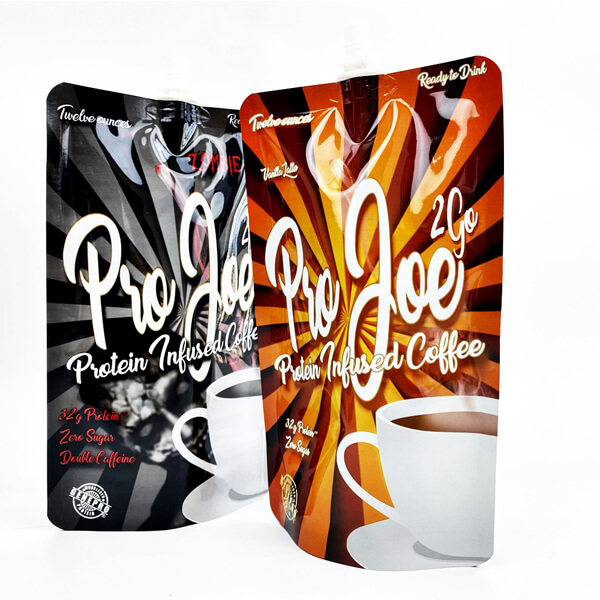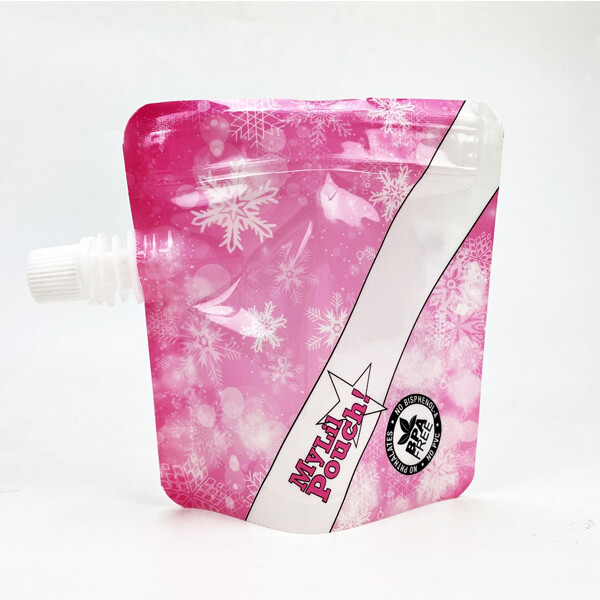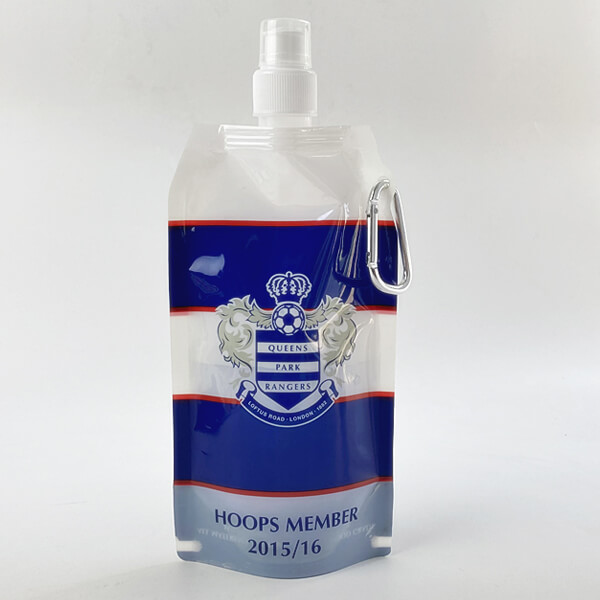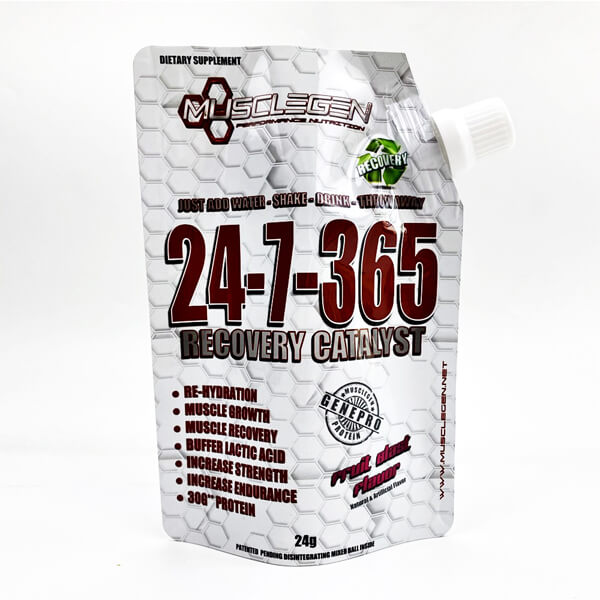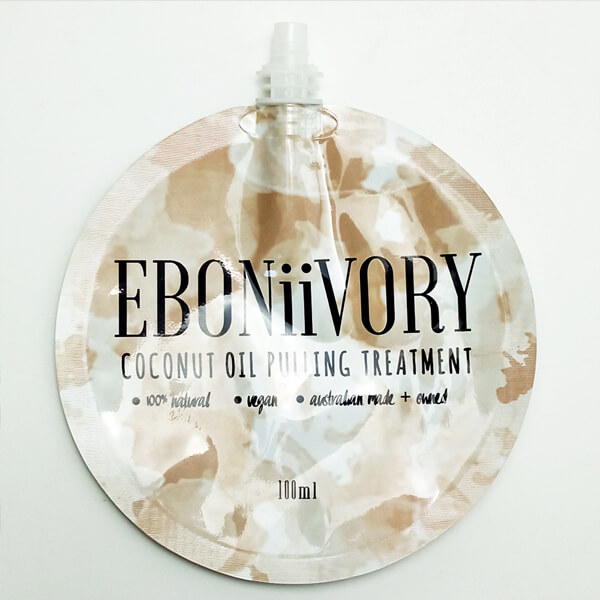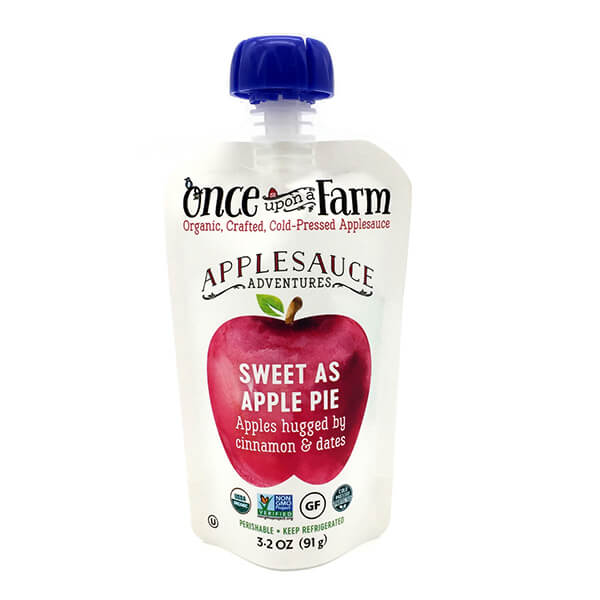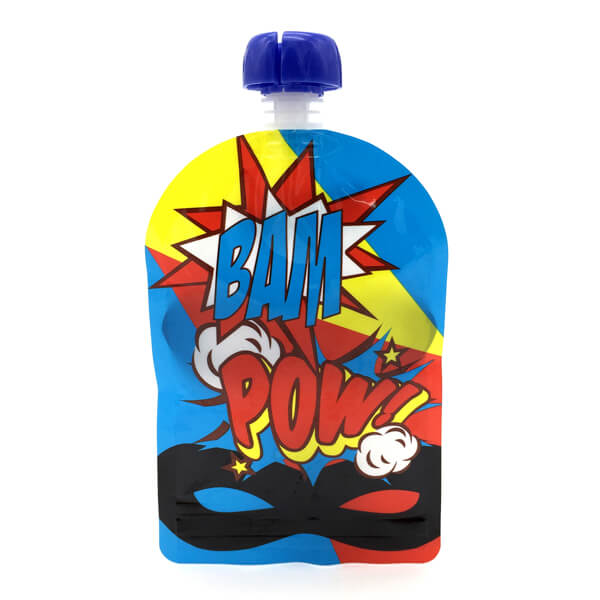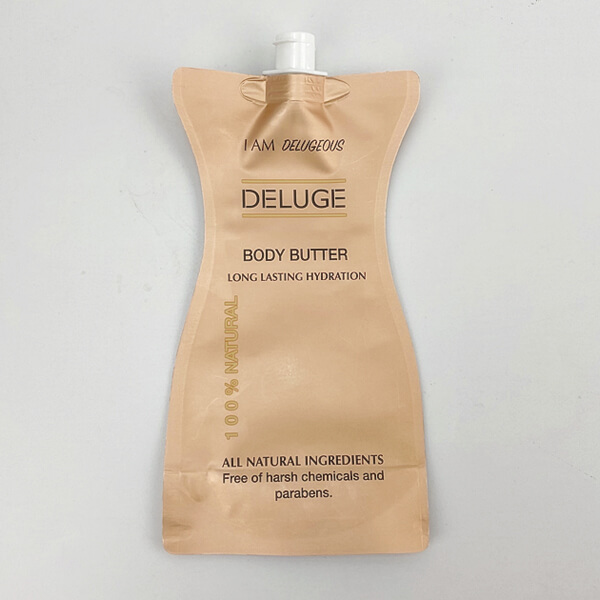Home » Bags & Pouches » Spout Pouches » Recyclable Spout Pouches
Recyclable Spout Pouches
Designed as a flexible alternative to rigid containers, recyclable spout pouches (also known as fitment pouches) are increasingly popular with brand owners and retailers for packaging liquid, sticky and fine powder products.
Please note that we have a MOQ for our pouch. For pouches in stock, the MOQ is 500 pcs. For customized pouches, please see the MOQ as followed:
1, Digital Printing — 500 pcs
2, Gravure Printing — 5,000pcs
Rinpac assists you throughout your project: bag shape, material, thickness, capacity and printing options. Please contact us or mark your requirements on the inquiry quotation.
Order single or thousands of items at a time. Our warehouse and flexible shipping options are available for last-minute, deadline critical orders.
- Free Sample
*Customization is always available, please mark down your need in cart or just contact us.
Specification of Recyclable Spout Pouches
| Features | We have the capability of producing spout pouches of custom shapes and specifications. |
| Advantages of the custom-shaped spout pouch | Standing out from the crowd with the unique shape: to differentiate the product from the competition by having a different look and feel than the general packaging |
| Artwork Enhancement: to enhance artwork with the matched shape of the packaging | |
| Disadvantages of the custom-shaped spout pouch | Tooling charges are required for the die-cut shape |
| Per customer’s design and requirements. | |
| Customizable Features | Shapes are customized to form your unique shape of the packaging. |
| Per customer’s design and requirements. | |
| Applicable to: 3 Side Seal Flat Pouch / Stand Up Pouch |
Request A Quote - Recyclable Spout Pouches
Need something helped in a short time? We’ve got a plan for you.
Introduction to Recyclable Spout Pouches
Recyclable spout pouches have emerged as a sustainable packaging solution amidst growing environmental concerns and a shift towards eco-friendly practices. These pouches are designed with the intention of reducing environmental impact by promoting recyclability and minimizing waste generation.
In recent years, the detrimental effects of traditional packaging materials on the environment have become increasingly evident, prompting businesses and consumers alike to seek alternatives that are more environmentally friendly. Recyclable spout pouches address this need by utilizing materials that can be easily recycled, thereby reducing the burden on landfills and natural ecosystems.
The purpose of recyclable spout pouches is twofold: to provide a practical and functional packaging solution for various products while also minimizing the environmental footprint associated with packaging materials. By offering a packaging option that can be recycled and reused, these pouches contribute to the broader goal of sustainable packaging practices and resource conservation.
In this article, we will explore the definition, benefits, applications, and manufacturing process of recyclable spout pouches, shedding light on their role in addressing environmental concerns and advancing sustainability in the packaging industry.
Rinpac offers high quality spout pouch packaging bags at affordable prices. Get quote now.
Benefits of Recyclable Spout Pouches
Recyclable spout pouches offer a multitude of benefits that make them a preferred choice for environmentally conscious consumers and businesses alike.
Environmental Impact
One of the most significant benefits of recyclable spout pouches is their positive environmental impact. By using materials that are recyclable, these pouches help reduce the amount of plastic waste that ends up in landfills or pollutes natural environments. Recycling spout pouches conserves resources, reduces energy consumption, and minimizes greenhouse gas emissions associated with the production of new packaging materials.
Convenience and Versatility
Recyclable spout pouches combine sustainability with practicality and versatility. Their lightweight and flexible design makes them easy to transport, store, and use, offering convenience to both manufacturers and consumers. Additionally, spout pouches are available in various shapes, sizes, and configurations, making them suitable for a wide range of products, including liquids, powders, and solids. The inclusion of a spout allows for precise pouring and dispensing, enhancing user experience and product usability.
Cost-Effectiveness
Another notable benefit of recyclable spout pouches is their cost-effectiveness. While initially perceived as a more premium packaging option, advancements in manufacturing technology and increased demand for sustainable solutions have led to more competitive pricing for recyclable pouches. Additionally, the lightweight nature of spout pouches reduces shipping costs and storage space requirements, further contributing to overall cost savings for businesses.
In summary, recyclable spout pouches offer a trifecta of benefits: they minimize environmental impact, provide convenience and versatility, and offer cost-effectiveness. These attributes make them an attractive packaging solution for brands looking to align with sustainability goals while meeting the needs and preferences of modern consumers.
Design and Material of Recyclable Spout Pouches
Materials Used
Recyclable spout pouches are typically constructed using a combination of materials that prioritize sustainability without compromising on functionality or durability. Common materials include:
Recyclable Plastic Films: High-quality polyethylene (PE) or polypropylene (PP) films are often used as the primary material for recyclable spout pouches. These plastics are chosen for their recyclability and ability to provide barrier properties that protect the contents from moisture, oxygen, and other external factors.
Biodegradable and Compostable Options: Some manufacturers offer recyclable spout pouches made from biodegradable or compostable materials such as bio-based plastics or plant-based polymers. These materials break down naturally over time, reducing their environmental impact and contributing to circular economy principles.
Paper and Cardboard: In certain applications, recyclable spout pouches may incorporate paper or cardboard elements, either as outer layers or as part of the laminate structure. These materials add strength and rigidity to the pouch while also offering recyclability and biodegradability.
Innovative Design Features
Recyclable spout pouches boast several innovative design features that enhance functionality, convenience, and sustainability. Some of these features include:
Spout Closure Mechanisms: Advanced spout closure systems ensure a secure seal to prevent leakage and maintain product freshness. Options may include screw caps, flip-top caps, or resealable zippers, each offering ease of use and reliable closure.
Built-in Handles or Grips: Some recyclable spout pouch designs incorporate built-in handles or grips, making them easier to carry and pour. These ergonomic features improve user experience and facilitate handling, particularly for larger pouch sizes or heavy contents.
Transparent Windows: Transparent windows or panels allow consumers to see the product inside the pouch, enhancing product visibility and shelf appeal. This design feature is especially valuable for showcasing the quality and freshness of the contents, such as colorful beverages or visually appealing snacks.
Customizable Shapes and Sizes: Recyclable spout pouches can be customized in terms of shape, size, and graphics to align with brand aesthetics and product requirements. Whether it’s a sleek stand-up design or a unique custom shape, manufacturers can tailor the pouch to meet specific branding and marketing objectives.
Incorporating these innovative design features and utilizing eco-friendly materials, recyclable spout pouches offer a sustainable packaging solution that prioritizes both environmental responsibility and consumer convenience.
Applications of Recyclable Spout Pouches
Food and Beverage Industry
Recyclable spout pouches find extensive application in the food and beverage industry, offering a versatile and eco-friendly packaging solution for a wide range of products. From sauces and condiments to liquid beverages and dairy products, these pouches provide excellent barrier properties to preserve freshness and flavor while minimizing environmental impact. Brands across the food and beverage sector leverage recyclable spout pouches for packaging products such as:
Sauces and Condiments: Ketchup, mayonnaise, mustard, and various dipping sauces benefit from the convenience and mess-free dispensing offered by spout pouches. The flexible design and reliable closure mechanisms make them ideal for storing and pouring these viscous liquids.
Liquid Beverages: Fruit juices, energy drinks, smoothies, and other liquid beverages are often packaged in recyclable spout pouches due to their lightweight, portable nature and ability to stand upright on store shelves. The transparent windows allow consumers to see the vibrant colors of the beverages, enhancing product visibility and appeal.
Dairy Products: Yogurt, milk, flavored milkshakes, and dairy-based desserts are commonly packaged in spout pouches, providing consumers with convenient single-serve options for on-the-go consumption. The secure spout closure ensures leak-proof storage and easy pouring without the need for additional utensils.
Household Products
Recyclable spout pouches are also widely utilized in the household products sector, offering practical and eco-friendly packaging solutions for various cleaning and laundry products. These pouches are designed to withstand the rigors of handling and transportation while minimizing the use of non-recyclable materials. Household products commonly packaged in recyclable spout pouches include:
Liquid Detergents: Laundry detergents, fabric softeners, and household cleaners benefit from the spill-proof design and easy dispensing provided by spout pouches. The compact packaging saves space on store shelves and in consumers’ homes while reducing packaging waste.
Cleaning Solutions: Multi-purpose cleaners, disinfectants, and specialty cleaning solutions are often packaged in recyclable spout pouches for their lightweight and flexible design. The integrated spout ensures precise pouring and controlled dispensing, minimizing product waste and mess.
Personal Care Products
In the personal care industry, recyclable spout pouches offer a sustainable packaging solution for a variety of liquid and semi-liquid products. From shampoo and conditioner to body wash and hand sanitizers, these pouches provide convenient and hygienic packaging options that appeal to environmentally conscious consumers. Common personal care products packaged in recyclable spout pouches include:
Shampoo and Conditioner: Hair care products in spout pouches are favored for their ease of use in the shower and reduced packaging waste compared to traditional bottles. The lightweight and flexible design also make them suitable for travel and on-the-go use.
Liquid Soaps and Body Wash: Liquid hand soaps, body washes, and shower gels are often packaged in recyclable spout pouches for their efficient dispensing and space-saving storage. The durable construction of the pouches ensures product integrity throughout the product’s lifecycle.
Hand Sanitizers: With increased emphasis on hygiene and sanitation, hand sanitizers have become essential products in everyday life. Recyclable spout pouches provide a convenient and portable packaging solution for hand sanitizers, allowing consumers to carry them in purses, backpacks, or pockets for easy access.
By catering to the diverse needs of these industries, recyclable spout pouches continue to gain traction as a sustainable packaging choice that combines functionality, convenience, and environmental responsibility.
Recycling Process of Recyclable Spout Pouches
Collection and Sorting
The recycling process for recyclable spout pouches typically begins with the collection of used pouches from consumers, recycling centers, or waste management facilities. These pouches are often collected alongside other recyclable materials such as plastic bottles, aluminum cans, and cardboard boxes.
Once collected, the pouches are sorted at recycling facilities to separate them from other types of packaging materials. Advanced sorting technologies, such as optical scanners and automated conveyor systems, are used to identify and segregate recyclable spout pouches based on their material composition and shape. Manual sorting may also be employed to ensure accuracy and efficiency in the sorting process.
Recycling Technologies
After sorting, recyclable spout pouches undergo various recycling technologies to transform them into reusable materials. The recycling process typically involves the following steps:
Cleaning and Preprocessing: The collected pouches are thoroughly cleaned to remove any contaminants such as food residues or labels. Preprocessing may also involve shredding or grinding the pouches into smaller pieces to facilitate further processing.
Melting and Extrusion: The cleaned and shredded pouches are melted down to form molten plastic resin. This molten resin is then extruded into thin strands or pellets, which can be used as raw material for manufacturing new products.
Molding and Forming: The extruded plastic resin can be molded or formed into various products, depending on the desired application. These products may include new spout pouches, plastic containers, furniture, or other plastic goods.
Quality Control and Testing: Throughout the recycling process, quality control measures are implemented to ensure the integrity and safety of the recycled materials. Testing may be conducted to assess the strength, durability, and purity of the recycled plastic resin before it is used in manufacturing.
Product Manufacturing: The recycled plastic resin is then used by manufacturers to produce new products, including spout pouches, packaging materials, or other plastic items. By incorporating recycled materials into their production processes, manufacturers can reduce their reliance on virgin plastic and minimize environmental impact.
By utilizing advanced recycling technologies and promoting the use of recycled materials, the recycling process for spout pouches contributes to the conservation of natural resources, reduction of waste sent to landfills, and overall sustainability efforts.
Consumer Awareness and Education of Recyclable Spout Pouches
Importance of Education
Consumer awareness and education play a vital role in promoting the recycling of spout pouches and other recyclable materials. By educating consumers about the importance of recycling and providing them with the necessary information and resources, we can encourage responsible waste management practices and foster a culture of sustainability.
Environmental Impact Awareness
Educating consumers about the environmental impact of waste, particularly non-recyclable materials like single-use plastics, helps raise awareness about the need for recycling. By understanding the consequences of improper waste disposal, individuals are more likely to make environmentally conscious choices, including recycling their spout pouches instead of discarding them.
Resource Conservation
Another key aspect of consumer education is highlighting the importance of resource conservation. By recycling spout pouches and other packaging materials, consumers contribute to the preservation of natural resources such as energy, water, and raw materials. Educating consumers about the finite nature of these resources and the benefits of recycling helps instill a sense of responsibility towards sustainable resource management.
Waste Reduction
Consumer education also plays a crucial role in waste reduction efforts. By promoting recycling practices and encouraging consumers to minimize their waste generation, we can work towards reducing the amount of waste sent to landfills and incinerators. Recycling spout pouches not only diverts waste from disposal sites but also conserves valuable landfill space and reduces the environmental impact of waste management.
Recycling Guidelines
To facilitate the recycling process and ensure the effective recycling of spout pouches, it is essential to provide consumers with clear and accessible recycling guidelines. These guidelines should include the following information:
Identification: Consumers should be educated about how to identify recyclable spout pouches and distinguish them from non-recyclable materials. Clear labeling and signage can help consumers identify the appropriate recycling symbols and understand which materials can be recycled.
Preparation: Consumers should be instructed on how to prepare spout pouches for recycling, including removing any residual contents, rinsing the pouches to remove contaminants, and flattening or compacting them to save space during collection and transportation.
Collection: Information about local recycling programs, collection schedules, and drop-off locations should be readily available to consumers. By providing convenient recycling options, such as curbside collection or community recycling centers, we can encourage greater participation in recycling efforts.
Sorting: Consumers should be informed about the importance of sorting recyclable materials correctly to prevent contamination and ensure the quality of recycled materials. Clear guidelines on which types of plastics are accepted for recycling and how to separate them from other materials can help streamline the recycling process.
Recycling Process: Educating consumers about the recycling process itself, including what happens to recycled materials after collection, helps demystify the process and instill confidence in recycling efforts. Providing information about the benefits of recycling, such as conserving energy and reducing greenhouse gas emissions, can motivate consumers to participate actively in recycling programs.
By prioritizing consumer education and providing comprehensive recycling guidelines, we can empower individuals to make informed decisions and take meaningful action towards a more sustainable future.
Challenges and Limitations of Recyclable Spout Pouches
Contamination Issues
One of the primary challenges associated with recycling spout pouches is contamination. Contamination occurs when non-recyclable materials, food residues, or other contaminants are mixed with recyclable materials, reducing the quality and value of the recycled materials. Spout pouches, like many other types of packaging, can be difficult to clean thoroughly, leading to residual food or beverage residues that contaminate the recycling stream.
Impact on Recycling Process
Contamination poses several problems for the recycling process. First, it can affect the quality of recycled materials, making them less desirable for manufacturers seeking high-quality raw materials. Contaminated materials may require additional processing or sorting, increasing recycling costs and reducing efficiency. Moreover, contamination can lead to equipment damage and downtime at recycling facilities, further complicating the recycling process.
Consumer Education
Addressing contamination issues requires a multifaceted approach that includes consumer education and outreach. Educating consumers about proper recycling practices, such as rinsing spout pouches before recycling and separating them from other materials, can help reduce contamination levels. Clear labeling and recycling guidelines can also assist consumers in making informed recycling decisions and minimizing contamination risks.
Industry Solutions
In addition to consumer education, industry stakeholders play a crucial role in addressing contamination challenges. Packaging manufacturers can develop innovative designs and materials that facilitate easier cleaning and recycling of spout pouches. Improvements in packaging design, such as removable spouts or separable layers, can enhance recyclability and reduce contamination risks.
Infrastructure Challenges
Another significant limitation in recycling spout pouches is the lack of adequate recycling infrastructure. Many communities lack the necessary facilities and resources to process and recycle flexible packaging like spout pouches effectively. Traditional recycling facilities may not be equipped to handle these materials, leading to limited recycling options for consumers and businesses.
Collection and Sorting
Infrastructure challenges extend to collection and sorting processes, where outdated or insufficient equipment may struggle to handle spout pouches efficiently. Manual sorting processes can be time-consuming and labor-intensive, increasing processing costs and limiting the scalability of recycling programs. Investing in advanced sorting technologies and automated equipment can improve sorting accuracy and efficiency, enabling more effective recycling of spout pouches and other flexible packaging materials.
Collaboration and Investment
Addressing infrastructure challenges requires collaboration between government agencies, recycling facilities, packaging manufacturers, and other stakeholders. Governments can incentivize investment in recycling infrastructure through grants, tax incentives, and public-private partnerships. Similarly, industry leaders can invest in research and development initiatives to improve recycling technologies and develop more sustainable packaging solutions.
Future Trends and Innovations of Recyclable Spout Pouches
Technological Advancements
The future of recyclable spout pouches is closely linked to ongoing technological advancements aimed at improving recycling processes and increasing the efficiency of material recovery. One area of innovation involves the development of advanced sorting technologies that can accurately identify and separate spout pouches from other recyclable materials. These technologies, such as optical sorting systems and artificial intelligence-based algorithms, enable automated sorting of diverse packaging materials, including spout pouches, thereby streamlining the recycling process and reducing contamination.
Another promising technological advancement is the emergence of smart packaging solutions equipped with embedded sensors and tracking devices. These sensors can provide real-time data on packaging usage, recycling rates, and environmental impacts, empowering consumers and businesses to make informed decisions about their packaging choices. By harnessing the power of Internet of Things (IoT) technology, smart spout pouches can contribute to a more transparent and sustainable packaging supply chain.
Sustainable Practices
In addition to technological innovations, future trends in recyclable spout pouches are shaped by a growing emphasis on sustainable practices throughout the packaging industry. Manufacturers and brand owners are increasingly adopting eco-friendly materials and production processes to minimize environmental impact and meet consumer demand for sustainable packaging solutions. This shift towards sustainability encompasses various aspects of spout pouch design and manufacturing, including:
Biodegradable Materials
The use of biodegradable materials derived from renewable sources, such as plant-based polymers and compostable films, is gaining traction as an alternative to traditional plastics. These materials offer the advantage of biodegrading naturally in the environment, reducing the accumulation of plastic waste in landfills and oceans. By incorporating biodegradable components into spout pouches, manufacturers can enhance the recyclability and eco-friendliness of their packaging solutions.
Closed-Loop Recycling Systems
Closed-loop recycling systems, also known as circular economy models, represent a paradigm shift in the way packaging materials are produced, used, and recycled. In a closed-loop system, spout pouches and other packaging materials are designed for recyclability from the outset, with materials being recovered and reintegrated into the production process to create new packaging products. This holistic approach to recycling minimizes waste and resource consumption, creating a sustainable cycle of material reuse and regeneration.
Collaborative Initiatives
Collaboration among industry stakeholders, including packaging manufacturers, retailers, recycling facilities, and government agencies, is essential for driving sustainable practices and advancing the recycling agenda. Collaborative initiatives such as extended producer responsibility (EPR) programs and voluntary recycling commitments enable collective action towards achieving common sustainability goals. By working together to develop and implement sustainable packaging solutions, stakeholders can accelerate the transition to a more circular and environmentally responsible packaging industry.
Conclusion
In conclusion, recyclable spout pouches offer a multitude of benefits that make them an attractive packaging solution for businesses across various industries. From convenience and versatility to sustainability and cost-effectiveness, these pouches are revolutionizing the way products are packaged and consumed. With the ongoing technological advancements and growing emphasis on sustainable practices, the future of recyclable spout pouches looks promising.
As Rinpac strive to adopt more sustainable packaging practices and meet the evolving needs of consumers, recyclable spout pouches emerge as a compelling choice. To explore the benefits of incorporating recyclable spout pouches into your packaging strategy and contribute to a more sustainable future, contact us today for a consultation.
Buy bags and pouches from Rinpac for your products at wholesale prices.
FAQs
Are spout pouches recyclable?
Spout pouches are typically not easily recyclable due to their multi-layered construction. The combination of materials, such as plastic and aluminum, makes recycling challenging. While some facilities may accept them for recycling, many do not have the capability to effectively separate and process the different layers.
What are the disadvantages of spout pouches?
Advantages of spout pouches are as follow:
- Limited recyclability: As mentioned, spout pouches often pose challenges for recycling due to their complex composition.
- Environmental impact: The production of spout pouches may contribute to environmental issues, particularly if they are not disposed of properly.
- Barrier to biodegradation: Spout pouches may take a long time to degrade in the environment, contributing to plastic pollution.
- Potential for leakage: Depending on the quality of the seal, spout pouches may be prone to leakage, which can be inconvenient and messy for consumers.
Are refill pouches recyclable?
Refill pouches can vary in recyclability depending on their materials. Some refill pouches may be recyclable if they are made from a single type of plastic that is accepted by recycling facilities. However, like spout pouches, those with complex constructions may pose challenges for recycling.
Are plastic pouches recyclable?
Plastic pouches may or may not be recyclable depending on the type of plastic they are made from and local recycling capabilities. Some plastic pouches made from recyclable materials like PET or HDPE may be accepted by recycling facilities. However, pouches with mixed materials or those made from plastics that are not easily recyclable may end up in landfills or contribute to pollution if not disposed of properly. It’s essential to check with local recycling guidelines to determine whether specific plastic pouches can be recycled in your area.

